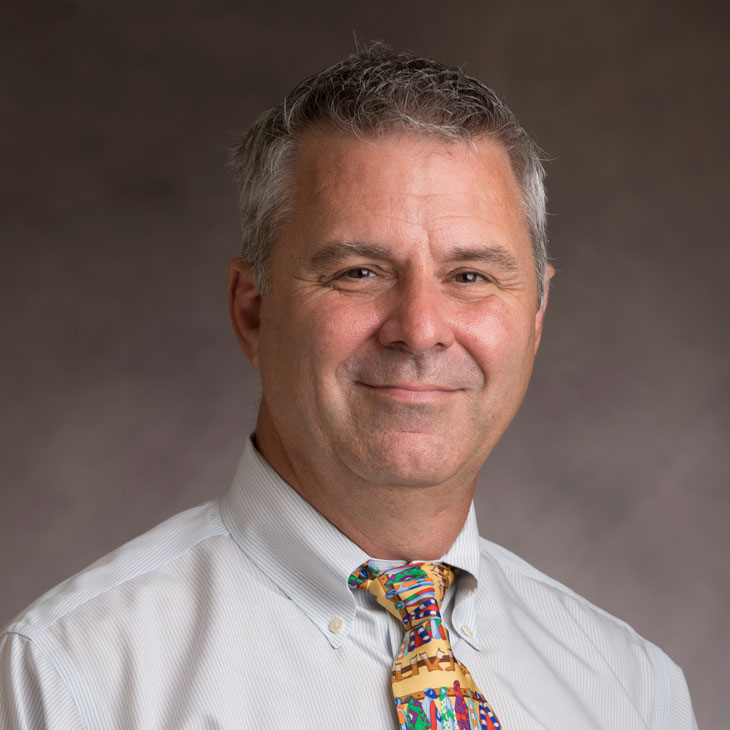
Vet Med Faces of Research: Dr. Michael Davis
Tuesday, July 27, 2021
Dr. Michael Davis is a professor, the Oxley Endowed Chair in Equine Sports Medicine and the director of the Comparative Exercise Physiology Laboratory at Oklahoma State University’s College of Veterinary Medicine.
Funded by a Grayson-Jockey Club grant, his current research focuses on gaining a better understanding of a horse’s skeletal muscle function.
“We’re trying to understand how a horse’s skeletal muscle tolerates, or doesn’t tolerate, the high temperatures and high levels of lactic acid typical of a horse that is strenuously exercising,” Davis said. “When the horse exercises, the muscle temperature goes up tremendously and the muscle starts producing a lot of lactic acid. The belief is that this contributes to the horse eventually tiring, but we don’t know that for sure. Now we have the right instrumentation to be able to determine how well the horse’s muscles tolerate those kinds of conditions. We also have the ability to look at the horse’s muscle over time. We can see whether or not the muscle of the horse tolerates heat and lactic acid more and is able to continue to work correctly even in the face of temperatures up to 108 or 110 degrees Fahrenheit with pH values down close to six.
“In this particular project, we basically start with eight untrained horses. Horses that were athletes in the past but haven’t been exercising for a while so they are completely unfit. We get a muscle biopsy and analyze the muscle tissue under different conditions. Then the horses under goes a 10-week conditioning program, similar to what trainers would use at a racetrack to get the horse fit. We’re not necessarily getting them all the way to the point where they could compete successfully at a racetrack but we’re getting them pretty close and then we take the biopsy again to see whether the horse’s skeletal muscle has changed with regards to how well it handles high temperatures and low pH.
“The most immediate beneficiaries are going to be the horses. We’ll have a better understanding of what conditioning is doing and what it’s not doing. Being able to identify horses that are particularly sensitive to high temperature or low pH may mean that those horses may need a different training program, or may simply need to do a different sport than what somebody originally had in mind for them.
“In the long run, this is going to be one of the most comprehensive assessments of skeletal muscle function that’s ever been done in any species. What we find here in these horses is going to shape what other labs eventually do for every other species including humans. So a basic understanding of how skeletal muscle responds to high temperatures generated during exercise and whether or not you can improve that tolerance through conditioning is going to benefit anything that’s exercising.
“What I would love people to understand about this project is that even though it doesn’t necessarily have an immediate application, this will allow other people to come up with projects that will be immediately applicable because we’ll have a much better understanding of how the horse works. We really appreciate the donors, like Grayson-Jockey Club, who make this sort of research possible. This is a far-reaching project that is going to shape many different projects down the road. This has been a long process. While we have had the machines for nearly 10 years, we had to test them, test the assays and make sure everything was in line before we started spending grant money. But we’re really hitting our stride now. We are generating data that is going to mean a lot to many different people and that’s exciting.”
Vet Med Faces of Research is a monthly series designed to inform the public about the impact of the numerous studies being conducted at Oklahoma State University’s College of Veterinary Medicine. Advancing knowledge and understanding for the benefit of the lives and livelihoods of the people of Oklahoma is a critical element of OSU’s land-grant mission. If you would like to support research at the college, please contact Ashley Hesser, director of development with the OSU Foundation, at 405-385-0715 or ahesser@osugiving.com.
